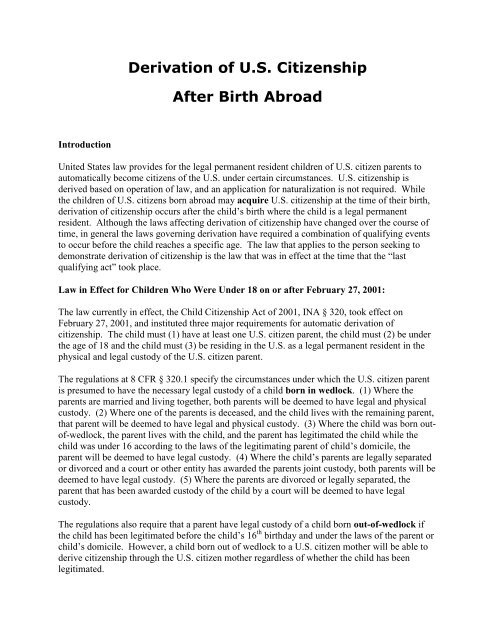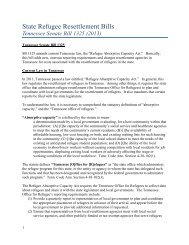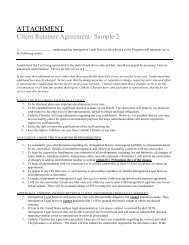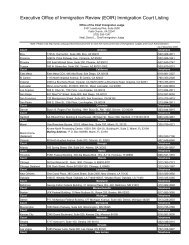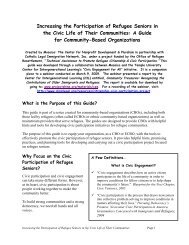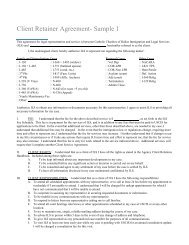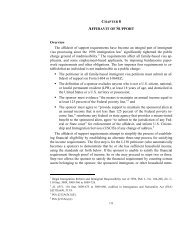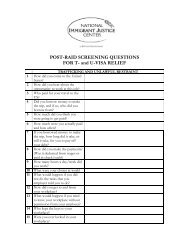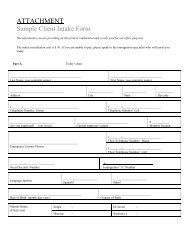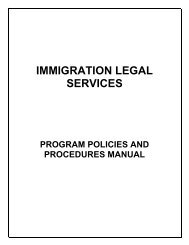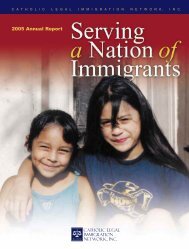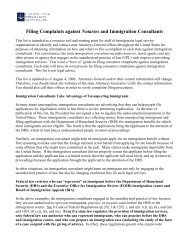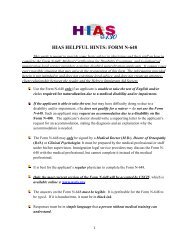Derivation of U.S. Citizenship After Birth Abroad
Derivation of U.S. Citizenship After Birth Abroad
Derivation of U.S. Citizenship After Birth Abroad
Create successful ePaper yourself
Turn your PDF publications into a flip-book with our unique Google optimized e-Paper software.
<strong>Derivation</strong> <strong>of</strong> U.S. <strong>Citizenship</strong><br />
<strong>After</strong> <strong>Birth</strong> <strong>Abroad</strong><br />
Introduction<br />
United States law provides for the legal permanent resident children <strong>of</strong> U.S. citizen parents to<br />
automatically become citizens <strong>of</strong> the U.S. under certain circumstances. U.S. citizenship is<br />
derived based on operation <strong>of</strong> law, and an application for naturalization is not required. While<br />
the children <strong>of</strong> U.S. citizens born abroad may acquire U.S. citizenship at the time <strong>of</strong> their birth,<br />
derivation <strong>of</strong> citizenship occurs after the child’s birth where the child is a legal permanent<br />
resident. Although the laws affecting derivation <strong>of</strong> citizenship have changed over the course <strong>of</strong><br />
time, in general the laws governing derivation have required a combination <strong>of</strong> qualifying events<br />
to occur before the child reaches a specific age. The law that applies to the person seeking to<br />
demonstrate derivation <strong>of</strong> citizenship is the law that was in effect at the time that the “last<br />
qualifying act” took place.<br />
Law in Effect for Children Who Were Under 18 on or after February 27, 2001:<br />
The law currently in effect, the Child <strong>Citizenship</strong> Act <strong>of</strong> 2001, INA § 320, took effect on<br />
February 27, 2001, and instituted three major requirements for automatic derivation <strong>of</strong><br />
citizenship. The child must (1) have at least one U.S. citizen parent, the child must (2) be under<br />
the age <strong>of</strong> 18 and the child must (3) be residing in the U.S. as a legal permanent resident in the<br />
physical and legal custody <strong>of</strong> the U.S. citizen parent.<br />
The regulations at 8 CFR § 320.1 specify the circumstances under which the U.S. citizen parent<br />
is presumed to have the necessary legal custody <strong>of</strong> a child born in wedlock. (1) Where the<br />
parents are married and living together, both parents will be deemed to have legal and physical<br />
custody. (2) Where one <strong>of</strong> the parents is deceased, and the child lives with the remaining parent,<br />
that parent will be deemed to have legal and physical custody. (3) Where the child was born out<strong>of</strong>-wedlock,<br />
the parent lives with the child, and the parent has legitimated the child while the<br />
child was under 16 according to the laws <strong>of</strong> the legitimating parent <strong>of</strong> child’s domicile, the<br />
parent will be deemed to have legal custody. (4) Where the child’s parents are legally separated<br />
or divorced and a court or other entity has awarded the parents joint custody, both parents will be<br />
deemed to have legal custody. (5) Where the parents are divorced or legally separated, the<br />
parent that has been awarded custody <strong>of</strong> the child by a court will be deemed to have legal<br />
custody.<br />
The regulations also require that a parent have legal custody <strong>of</strong> a child born out-<strong>of</strong>-wedlock if<br />
the child has been legitimated before the child’s 16 th birthday and under the laws <strong>of</strong> the parent or<br />
child’s domicile. However, a child born out <strong>of</strong> wedlock to a U.S. citizen mother will be able to<br />
derive citizenship through the U.S. citizen mother regardless <strong>of</strong> whether the child has been<br />
legitimated.
A child born out-<strong>of</strong>-wedlock must be legitimated by and residing with the U.S. citizen parent.<br />
Legitimation must occur pursuant to the laws <strong>of</strong> either the father’s <strong>of</strong> the child’s residence or<br />
domicile.<br />
Adopted children may also derive citizenship through a U.S. citizen parent, provided that the<br />
adoption conforms to the requirements <strong>of</strong> INA 101(b)(1). However stepchildren may not derive<br />
citizenship through a U.S. citizen step-parent, unless they are also adopted.<br />
Law in Effect for Children Who Were Under 18 on or after October 5, 1978 and prior to<br />
February 26, 2001:<br />
Prior to the Child <strong>Citizenship</strong> Act <strong>of</strong> 2001, a permanent resident child derived citizenship if both<br />
parents naturalized, the child was under age 18, and the child was not married. If both parents<br />
did not naturalize, the child could also derive citizenship if one <strong>of</strong> the following took place: (1)<br />
the other parent was or became a U.S. citizen prior to the child’s 18 th birthday, (2) the child was<br />
born out-<strong>of</strong>-wedlock and not legitimated before the age <strong>of</strong> 16 and the naturalized parent was the<br />
mother, (3) the child’s other parent was deceased, or (4) the parents were divorced or separated<br />
the naturalized parent had legal custody <strong>of</strong> the child following divorce or separation.<br />
If the child is born out-<strong>of</strong>-wedlock and is legitimated, the child can derive only if both parents<br />
naturalize, or if the non-naturalizing parent is dead.<br />
Adopted children may derive citizenship if the child is residing in the U.S. at the time <strong>of</strong> the<br />
adoptive parent’s naturalization, is in the legal custody <strong>of</strong> the adoptive parent, is a lawful<br />
permanent resident and the adoption occurred before the child turned 18. Stepchildren cannot<br />
derive citizenship.<br />
Law in Effect for Children Who Were Under 18 on or after December 24, 1952 and prior<br />
to October 5, 1978:<br />
The law in effect between December 24, 1952 and October 5, 1978 contained the same<br />
requirements as the law in effect from October 5, 1978 to February 26, 2001, with one exception.<br />
The law in effect from December 24, 1952 through October 5, 1978 did not provide for<br />
derivation <strong>of</strong> citizenship for adopted children.<br />
For <strong>Derivation</strong> Requirements in Earlier Statutes, see Chart C.


